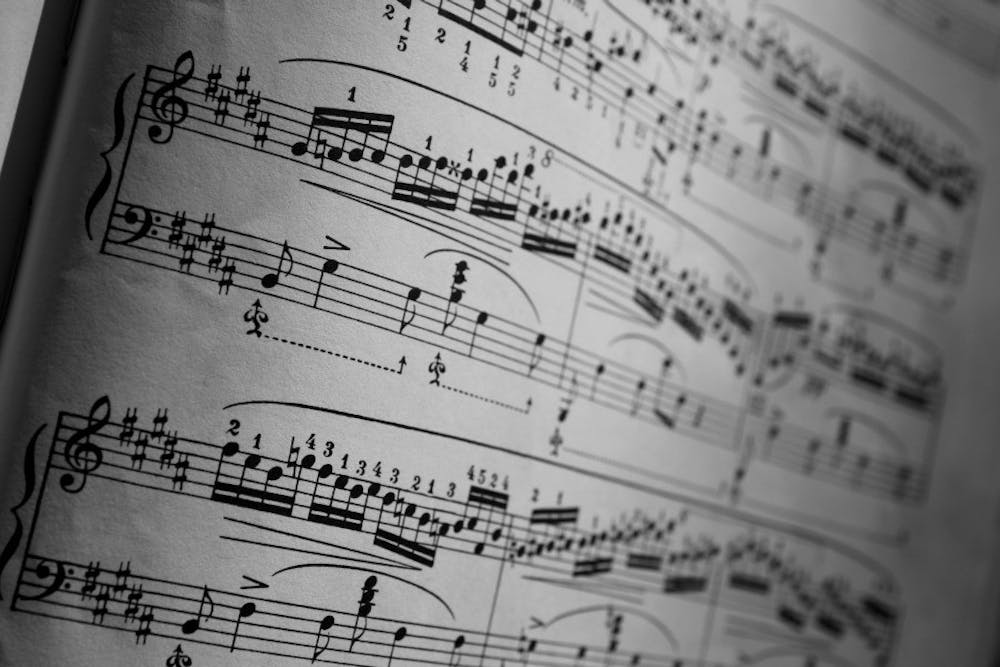By Emma Shibley, For The Miami Student
It's Wednesday, Nov. 18, mid-afternoon. It's raining outside - not torrential, but tenacious. In Presser Hall's basement, members of the Miami University Symphony Orchestra (MUSO) wait to start rehearsal, five days away from their final concert of the semester.
Inside the rehearsal room, cello cases are propped up in a corner like wet boots. Carolina blue, matte lavender, shell pink. Another in rich burgundy brown stands upright, open halfway - a welcoming invitation.
"We're all here today," says a trombone player to the orchestra's student manager, gesturing confidently to his row.
Another player walks in and sits down next to him. The manager makes a tick on the attendance sheet. Everything is as it should be.
But Ricardo Averbach is missing from his usual post at the podium.
Instead of raising his baton to begin rehearsal, he's one time zone and a flight away to guest-conduct a concert with the National Symphony Orchestra of the Dominican Republic. Probably on a beach somewhere, jokes today's substitute conductor, Patrick Reynolds from the Dayton Philharmonic.
"I'll be conducting Tchaikovsky's Fifth Symphony here and then I'll go back to Miami and conduct his Sixth," Averbach says, from the Dominican Republic.
That would be Pyotr Ilyich Tchaikovsky, the Russian composer behind cinematic ballets like "The Nutcracker," "Swan Lake" and "Romeo and Juliet."
Averbach thought no music would better fit the special occasion of this particular concert - the Miami University Symphony Orchestra's 100th anniversary. The Miami Student announced Nov. 23, 1915, that the formation of an official, full-sized orchestra was underway.
And it isn't just MUSO's centennial being honored Monday evening. Averbach planned this concert as a send-off, too, for Miami President David Hodge and for Karen Dawisha, director of the Havighurst Center for Russian and Post-Soviet Studies. Both will be retiring at the end of the academic year.
Ten years ago, Averbach and Dawisha collaborated to send the orchestra abroad, giving students the chance to learn from and perform with musicians from the St. Petersburg Conservatory, of which Tchaikovsky himself is an alumnus.
"I'll try to stay out of your way," promises Reynolds as Wednesday's rehearsal begins. "Let's start in the third movement, that's where I can do the least damage."
The violins play a pizzicato section, their bows aiming nearly vertical and bobbing up and down as their fingers pluck the strings, slim sailboat masts in a regatta race. The airy music turns bombastic and a percussionist attacks the bass drum with a fortissimo roll. Reynolds looks up with lifted eyebrows and a bemused smile. He keeps conducting.
"[Tchaikovsky] actually died just a few days after the premiere of this symphony … this was the last piece he wrote," Averbach says.
Instead of finishing with a bang and eliciting grand applause, Tchaikovsky's Symphony No. 6 ends soft and somber.
"This symphony sounds like a farewell to Tchaikovsky - a farewell to life," says Averbach.
The piccoloist picks up her flute and, with a wag of her Ugg boot, sets the instrument in her lap. She rubs the bridge of her nose with her fingers. This piece of music lasts nearly an hour.
"It's a great test of endurance for the orchestra to play [that long] in a way that makes sense," Averbach says. "But the most important thing is to go beyond that and be able to really say something with the music."
The ensemble has spent hours of rehearsal in sectionals, "woodshedding" the trickiest sections. The goal now is to play the entire piece start to finish.
Graduate music student Dylan Drake thinks the feeling of triumph achieved at the end of such a long performance will make the concert worth it.
"Making it a hundred years says a lot in itself… especially in the music world. [With] the decrease in support and funding for the musical arts, it's amazing that something like this has lasted so long and [is] still performing at that level," Drake says.
But after 100 years and thousands of rehearsals, it can still be hard to get to everything in one afternoon.
"What do we have, five minutes?" Reynolds asks, about to move on to the only other piece in the concert, a ballet excerpt also by a Russian composer.
"Promise you won't tell anyone we didn't get to the Khachaturian?"

